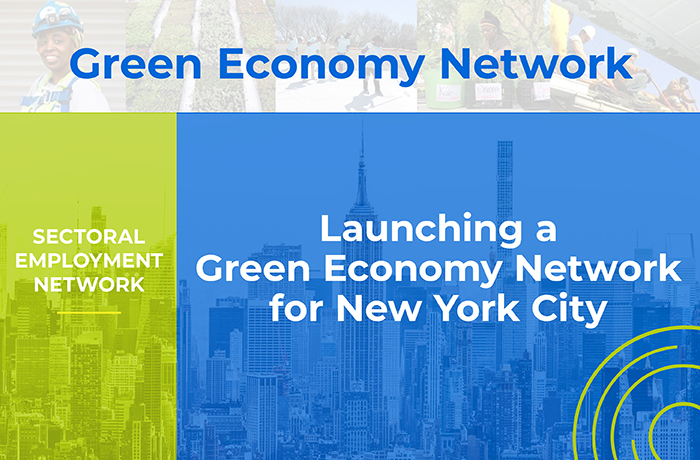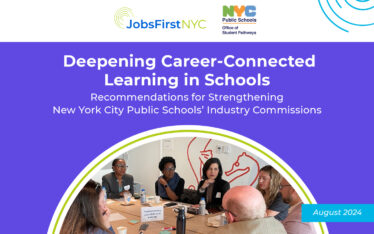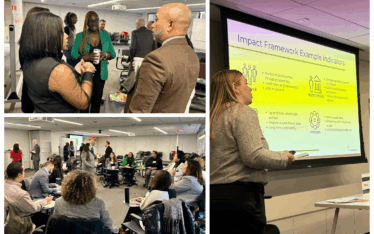On October 27, 2020, NYC’s first Green Economy Network was launched as part of a broader collaborative effort anchored by JobsFirstNYC, Green City Force, The HOPE Program, and Nontraditional Employment for Women. The initial meeting of this group centered opportunities at one of NYC’s largest drivers of local green jobs, the New York City Housing Authority (NYCHA) and State level investments into the green economy and workforce development, as well as exploring the benefits of a network structure. While the network is very much in its infancy, it is deeply rooted in a desire to work collaboratively to ensure that Black and Brown young adults, women, and those most affected by the converging crises of health, racial equity, and climate change are able to access good, career path jobs in the green economy.
Discussing the impetus for launching a new green economy network, Kathleen Culhane, Jennifer Mitchell, and Lisbeth Shepherd discussed the increased investments and growing opportunities in the sector and reflected on why we need to be training a diverse workforce to be prepared for incoming economic opportunity. They also emphasized how a network structure will better position the workforce development field to be responsive to talent development and employer needs.
Adele Ferranti, Program Manager at NYSERDA, highlighted NYSERDA’s role as an innovator in New York State green jobs workforce development. According to Adele, since 2016, there has been a 9% increase in the amount of clean energy jobs. NYSERDA has also set a meaningful trend of providing education for both new and seasoned workers. By using an On-the-Job-Training strategy that partially funds worker’s pay while they are being trained, further incentive is being provided for workers who are interested in clean energy jobs. NYSERDA’s paid internship programs also allow an introduction to various career options in the green economy workforce. This approach will be instrumental in their overall goal of attracting and retaining talent.
The New York City Housing Authority’s (NYCHA) current financial investments and opportunities for collaboration in the green economy were detailed by Shanna Castillo, Director, Resident Economic Empowerment & Sustainability, NYCHA, and Ellen Zielinski, Director of Energy & Sustainability, NYCHA. They shared the NYCHA Mitigation Roadmap and emphasized that there are billions of dollars in investments and compliance mandates driving sustainability projects and related career paths in NYCHA. These investments have opened up opportunities for collaboration in the workforce and employer communities, as well as philanthropic partners.
The power of collective partnership in influencing change and creating real economic opportunities for communities most affected by economic change, such as the growth of a green economy, was emphasized by Gaspar Caro, Partnership Director, Lower East Side Employment Network (LESEN). He noted that incoming economic development spurred the formation of LESEN. Currently, the LESEN plays an important role in supporting diversity, inclusion, equity, and access for the Lower East Side community. Gaspar described the collective bargaining benefits of multiple agencies partnering together, and how individual agency leadership and teams prioritized partnership objectives even prior to having designated resources. JobsFirstNYC facilitated a process for it to expand and strengthen, and introduced the dual customer approach of an employer-facing network.
Speaking on behalf of the Green Economy Network pilot, which also includes Aram Marcelle, Alumni Training & Advancement Manager at Green City Force, and TreyMichael Reid, Business Development Manager at The HOPE Program & Sustainable South Bronx, Erik Antokal, Assistant Vice President, Programs at Nontraditional Employment for Women, presented the model and highlighted the value of working with an intermediary like JobsFirstNYC. Erik shared what it takes to build a process for developing a network: agency support to engage, an interest in doing something different to increase opportunity and access for clients, and the necessity of having an objective facilitator — JobsFirstNYC’s role. He described how this group has already begun effectively sharing job opportunities and cross referring clients. The benefits of having a space to share best practices has also been really valuable, especially with unexpected shifts brought on by the pandemic.
Overall, this meeting was an important step in setting the context and laying the foundation for the future of the network. The work continued in December, with the group reconvening to investigate labor market conditions in the green economy and to learn more about the JobsFirstNYC partnership process. Click here to read about the December 2020 meeting.




